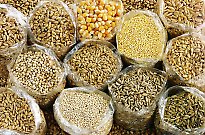
10 reasons to avoid grains

Improve your health
Evidence suggests omitting certain grains from your diet may improve health and vitality, says Caroline Robertson
So what are the side effects of consuming too many grains?
1. Gas, cramps, constipation, diarrhea and candida can arise from undigested fermenting grains bubbling in the bowel. This is due to antinutrients like lectins, allergens such as gluten and the corn protein called zein.
2. High calories and low nutrition in gqs compared to fruit, vegetables, meat and nuts can cause ‘overconsumption and under-nutrition’ syndrome. Filling up on grains reduces our intake of more valuable nutrient-dense foods.
3. Phytates in grains inhibit fatty acid and mineral absorption, especially iron and zinc. Phytates demineralise teeth and bones adversely. Phytic acid can be reduced by soaking, cooking or fermenting grains.
4. Gluten and lectins are large antinutrients that can cause gut inflammation, allergies and malabsorption. In those with coeliacs, crohns, ulcerative colitis, diverticulitis and IBS, this creates serious symptoms such as pain, diarrhea, bleeding and nausea. A gluten allergy is also linked to heart problems, as the inflammatory response causes cholesterol levels to rise and calcium deposits to harden arteries and raise blood pressure.
The gliadin protein gluten is highest in wheat, oats, barley and rye but there are also large protein molecules in corn and rice that can aggravate gut inflammation. Legumes also contain lectins.
5. Acidic grains increase inflammation, degeneration, pain and tooth decay. As alkaline blood is essential for optimal energy and health, grains work against this.
6. Digestive flora is disturbed by the antinutrients of lectin and gluten and the chemicals in nonorganic grains. This causes leaky gut syndrome, where large undigested molecules enter the blood stream eliciting an autoimmune allergic reaction that attacks the body. Conditions connected with this include eczema, Hashimoto’s thyroiditis, rheumatoid arthritis, ulcerative colitis, lupus, psoriasis, multiple sclerosis and hormonal imbalances. The diarrhea associated with gluten intolerance causes a depletion of healthy gut flora and an overproliferation of harmful bacteria, bugs and fungus such as candida yeast. This is further provoked by the sugar and yeast often mixed with flours.
7. Insulin spikes from high carbohydrate intake fuel the rollercoaster of high and low blood sugar. The rebound hypoglycaemia triggers tiredness, dizziness, cravings and eventually diabetes.
8. Fat is stored when grains’ complex carbohydrates convert to simple sugar and the energy isn’t expended. Hence, eating grains and being sedentary encourages obesity and cellulite.
9. Arginine amino acid is extremely high in all grains and lysine is low. This triggers herpes outbreaks. High arginine also causes indigestion, nausea, headache, bloating, diarrhea, gout, blood abnormalities, allergies, asthma aggravation and eczema.
10. Psychological effects of grain intolerance may include anxiety, depression, dyslexia, fatigue, mood swings, ADHD and even autism according to Dr Natasha Campbell-McBride, creator of the GAPS diet.
NEXT: Learn more about Irritable Bowel Syndrome>>
By naturopath Caroline Robertson


